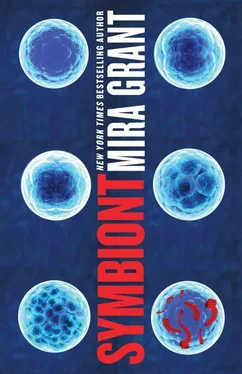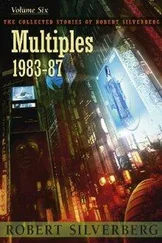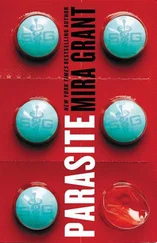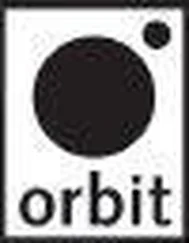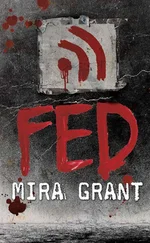“Earthquake kits,” I said. “I’d think the ferry people would want to be prepared for an earthquake making it unsafe to visit the gas station.”
“Good thinking!” Fishy yanked on a lever and finally stilled, putting his hands back on the wheel. The Ferry Building loomed directly ahead of us, seeming untouched by the changes to the city around it. It was a landmark, a place to visit for the Saturday Farmer’s Market or to buy expensive artisanal cheese, and just seeing it was enough to take a little of the tension out of my shoulders and loosen a little of the twisted panic that was knotted in my gut. If the Ferry Building was still standing, then not everything had changed. Most things, maybe, but not everything .
Fishy continued, blithely unaware of my relief: “The employee lot is off to the side. Most of the people who worked the ferry took public transit to work—which is sort of funny if you think about it—but there were always a few who needed to have a vehicle, for one reason or another. The odds are definitely with us that someone drove in and then got slaughtered, or turned sleepwalker, and didn’t need their keys anymore.”
“What if the keys aren’t in the car?” I asked anxiously. “Do you know how to drive without keys?”
“Do you actually know?” added Nathan. “Seeing it in a game of Grand Theft Auto isn’t the same thing.”
Fishy laughed. There was an odd underpinning of exhaustion to the sound, something I would have taken as completely normal from Nathan or even Dr. Banks, but which sounded out of place in Fishy’s normally jovial tone. “Yeah, I actually know,” he said, pulling back on another lever. The boat bled off a few more notches of speed, sliding smoothly under the canopy of the Ferry Building’s landing zone. We were almost there. “My wife—Laney—was a genius when it came to spreadsheets and numbers and knowing how your insurance policy worked, but she was a little bit of a space cadet when it came to remembering where she left her keys. I learned how to hot-wire a car after the third or fourth time she lost them so completely that we couldn’t figure out how we were going to get home. It was a challenge. I like challenges. I always have.”
I frowned a little, glancing uncertainly at Nathan. He gave a little shake of his head, signaling for me to stay quiet, and in this instance, listening to him seemed like the better idea.
“Once we have a car, the two of you can take Dr. Banks and head for SymboGen,” continued Fishy calmly. “I’ll stay with the boat, make sure we don’t get overrun with sleepwalkers or taken out by survivors or anything cliché and inconvenient like that.”
“But what will we do once we have Tansy?” I asked, alarmed. Our plan hadn’t involved Fishy staying behind.
He glanced back over his shoulder. “Bring her here. If I can’t stay docked, I’ll at least stay close to the shore, so you can see me. Then we’ll just have to find a place where you can park and I can pull in close enough that you can get on board. It’ll be a fun challenge.”
“A fun challenge,” I echoed faintly. I felt like I wanted to be sick. Throwing up would have been a terrible idea, but that didn’t make it any less appealing. That horrible hot/cold mixture was forming in my stomach again, and the drums were getting softer, harder to hear, which struck me as bad in some way I couldn’t entirely define.
“Tansy is going to be on life support,” said Nathan. “Putting her in the water could kill her.”
“Which makes it all the more important that someone stay with the boat.” Fishy turned the wheel delicately to the side, and we slid in along the dock as if our boat had been intended to sit there all along: the missing piece of an elaborate puzzle. “Welcome to San Francisco.”
Only one of the other ferry bays was occupied, by a boat that was half submerged and still taking on water through the gaping hole in its side. I had no idea what could have done that to one of these sturdy, metal-plated craft, and I didn’t want to know. The dock was clear, and nothing moved in the shadows. That was what really mattered to me, at least right now: that we were, for the moment, alone.
“Sal?” asked Nathan.
I nodded tightly and left the cabin, moving to the rail. Dr. Banks said something, but his words were washed away by the roar of the engine as Fishy did whatever he had to do in order to lock us into place, and so I just kept walking, turning my back on the scientist who had helped to make me. When I reached the edge of the boat I stopped, resting my hands on the railing, and closed my eyes, trying to listen with everything I had. The noise didn’t matter; my ears weren’t a part of this.
Pheromone trails are funny things. They’re both immediate, generated by bodies in motion, and left behind by bodies that have already passed. Ants use them to keep track of each other. Cats use them to claim things as part of their territory. And tapeworms use them, in a strange, incomprehensible way, to communicate. I didn’t know what an unaltered tapeworm would have to say, but I knew what the sleepwalkers were saying with their pheromone trails, and hence one of the things that I was saying to them when they happened to cross my path—maybe the most important thing:
Here I am .
The air in the Ferry Building was stale, thick with salt and a faint, sweet foundation of decay. There had been sleepwalkers here—I couldn’t have explained how I knew that, because the knowledge didn’t come with any accompanying words. Neither did the knowledge that they weren’t here now. The water was too close and too bitter, and it got too cold at night. They had been driven deeper into the city, or at least away from the dock area. What that was going to mean for the rest of our journey, I couldn’t say.
I let go of the rail and turned, unsurprised to find Nathan and Dr. Banks standing behind me. “There’s no one here but us,” I said. “It’s an enclosed space, though. There could be a hundred sleepwalkers outside and I wouldn’t know about it.”
Dr. Banks sneered. “Leave it to Surrey to build an early warning system that can’t work through walls. What use are you?”
“I don’t know,” I said. “But I guess I’ll have time to figure it out. Where’s Fishy?”
“He’s shutting down the engine, and then he’s going to come help us find a car,” said Nathan. “It should be a minute or so.”
The slow rumble of the boat beneath us died, leaving my feet tingling at the sudden lack of vibration. Fishy trotted out from the cabin, waving to make sure we knew that everything was all right. Beverly jumped, pressing herself hard against my legs. For one terrible moment, I expected to hear her growl come ripping through the still air of the Ferry Building like a condemnation. This was going too easily: something had to go wrong. That was how things went for us. Wrong.
Fishy slowed as he drew closer, and Beverly did not growl. “Are we clear?” he asked.
“No sleepwalkers in the building, but that doesn’t mean it’s going to stay that way, especially after we open a door,” I said. “I can’t be sure they’re not at the front, either. I’m still figuring out how all this works.”
“As long as they leave me alone long enough to get some fuel into this baby, I’ll be fine,” said Fishy, patting the side of the ferry. He was smiling, calmly and consistently.
I didn’t like that expression—something about it was off, somehow, although not in a way that would have meant he was going into conversion—but it was Nathan who spoke, asking, “Are you feeling all right, Fishy? I didn’t expect you to volunteer to stay behind.”
“Yeah, I’m good,” said Fishy calmly. “It’s all good. See, this is where we split the party to deliver the MacGuffin”—he pointed at Dr. Banks, who looked more confused than affronted—“and cure the zombie plague that’s been destroying mankind. You guys are running into a series of cut scenes. If I stay here with the boat, I’ll either get an unstoppable wave of enemies to fight, or I’ll be ready when you come back with the final boss fight in tow. Either way, I’m good.”
Читать дальше
